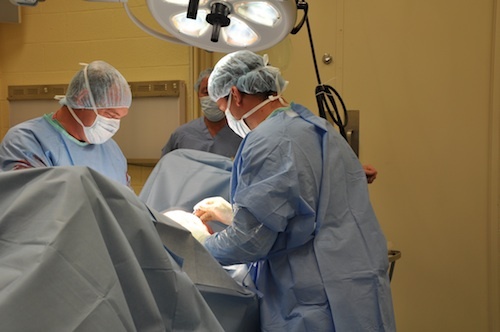Author: pbecadmin
Healthcare Reminder: Equine Summer Sores
The summer weather is here! With the humid weather, pesky flies are at their worst, which creates problems for many horse owners often leading to summer sores, medically known as Habronemiasis.
What are Summer Sores?
Summer sores are lesions on the skin caused by the larvae of equine stomach worms Habronema. These worms in the horse’s stomach produce eggs that pass through the digestive tract and are shed in the horse’s feces. Barn flies typically gather around manure and ultimately collect the parasite’s larvae on their extremities. Summer sores will occur when flies carrying the larvae deposit the eggs onto an open wound or the mucous membranes of a horse. The larvae infect the open wound or mucous membranes, causing an inflammatory reaction including symptoms of inflammation, discharge, and the production of granulation tissue infected with larvae.
Detecting Summer Sores
One way to detect a summer sore is the visible granulation of tissue containing small yellow, rice-like larvae within the skin and a mucopurulent (mucus or pus-like) discharge associated with the wound. Prevention is the most effective way of controlling summer sore outbreaks and the best way to protect horses is to implement effective methods for:

- fly control
- manure removal
- proper wound care
- an effective de-worming program
A diligent de-worming program is the most important element of prevention because effective de-wormer disrupts the parasite’s life cycle internally. The key is to kill both adult worms in the stomach and the larvae that form in the skin tissue.
Treating Summer Sores
For treatment of summer sores themselves, corticosteroids are administered to reduce the inflammatory hypersensitivity reaction, and antimicrobials treat any secondary infections that may develop as the result of an open wound. If not treated properly, summer sores can last up to several months and possibly require a costly surgical procedure to remove the granulated tissue and larvae. At the first sign of a summer sore, contact your veterinarian at Palm Beach Equine Clinic at 561-793-1599 to discuss treatment and develop an effective fly-management program for your barn.
Palm Beach Equine Clinic has the most advanced state-of-the-art diagnostic imaging equipment available. More specifically, Equine Standing Magnetic Resonance Imaging (MRI) allows Palm Beach Equine Clinic to quickly and accurately diagnose injuries for their clients.
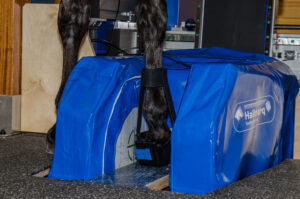
Every horse owner dreads seeing signs of lameness or discomfort in any horse, whether it is a backyard companion or a top-caliber sport horse. For performance horses, however, one of the first questions many owners ask upon contacting a veterinarian about a problem is, “Can the horse safely and comfortably return to work?” Using Palm Beach Equine Clinic’s cutting-edge equine standing MRI technology, the clinic veterinarians are best equipped to answer that question.
The equine standing MRI produces highly detailed images in several different planes to capture a complete image of the desired area. An MRI is best used to further define a specific area of bony or soft tissue that has been pinpointed as the origin of lameness. The process can be completed while the horse is in a standing position and requires only light sedation.
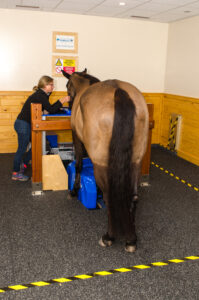
Lameness or performance problems are most frequently approached through routine x-rays and ultrasounds, which can come back normal. Thus, it is difficult to diagnose subtle problems because the most common tools are not sensitive enough to pick them up. At Palm Beach Equine Clinic, the Equine Standing MRI gives veterinarians an advantage when troubleshooting a lameness issue and helps them to determine a correct diagnosis in a timely manner.
Hundreds of MRIs are read each year at Palm Beach Equine Clinic. In addition to being a state-of-the-art diagnostic tool, the equine standing MRI technology also affords economic benefits to owners by having their horse’s problem diagnosed and treated safely, effectively, and quickly.
Palm Beach Equine Clinic’s surgical team leader, Dr. Robert Brusie, is a nationally renowned board-certified surgeon whose surgical specialties include orthopedic, arthroscopic, and emergency cases. Dr. Brusie has been the head surgeon with Palm Beach Equine Clinic for the last 20 years and is a beloved part of the team.
Dr. Brusie graduated from Michigan State University (MSU) College of Veterinary Medicine. He completed his surgical residency at the Marion DuPont Scott Equine Center in Virginia in 1989 and has been in private practice ever since. He became a Diplomate of the American College of Veterinary Surgeons in 1994. Dr. Brusie joined the Palm Beach Equine Clinic team in 1996.
Board-certified surgeon, Dr. Brusie is recognized for his expertise in colic surgery, as well as for his skill in arthroscopic surgery. His surgical experience expands the clinic’s progressive care in both emergency and elective procedures. He has published articles on numerous topics, including the equine intestinal tract and septic arthritis in horses. Dr. Brusie is married and has three daughters. Read on to find out more about Dr. Brusie!
What is your background with horses?
I grew up on a farm in Michigan. We had usually between 200 and 600 head of cattle and always between four to six horses. Our horses were cow ponies or driving horses. My dad loved horses and had to have them around. My family has owned our farm for six generations and it pretty much occupied all of our time besides sports and school. Needless to say, we didn’t have much time to show horses.
When and why did you decide to become a veterinarian? Did you know you wanted to be a surgeon from the start?
I decided to become a veterinarian at an early age. I think I was seven or eight years old when I pulled my first calf. One of my dad’s hired men called me “Doc” when I was about that age. When I went to college, my plan was to become a large animal veterinarian and live in my hometown and continue to farm part-time with my three brothers. All of that changed when I was in veterinary school at MSU. Dr. Ed Scott was one of the five surgeons there; he was a gifted surgeon and a great teacher. He steered me into an equine internship at Auburn University. It was one of those things that the more you did, the more you wanted to do to improve yourself. I operated on my first colic by myself when I was three weeks out of vet school (32 years ago).
How did you first start working at Palm Beach Equine Clinic?
I was a surgeon at a clinic in Atlanta, and in 1996 I had performed a surgery for a client of Dr. Paul Wollenman’s. He had started this practice in 1975 and asked me if I needed a job. I was planning on staying in Atlanta for the rest of my career. I received phone calls from the other two partners over the next nine months, and eventually with encouragement from my fiancé, now wife, Melissa, I took the job.
What do you love most about working at Palm Beach Equine Clinic?
We have an exceptional group of veterinarians and staff here. The depth and scope of our veterinarians is amazing due to the large caseload. On any individual case, there may be two to three doctors that have input on the case to ensure no stone is left unturned. Additionally, we are so privileged to work on some of the best show, race, and polo horses in the world. It is truly an honor.
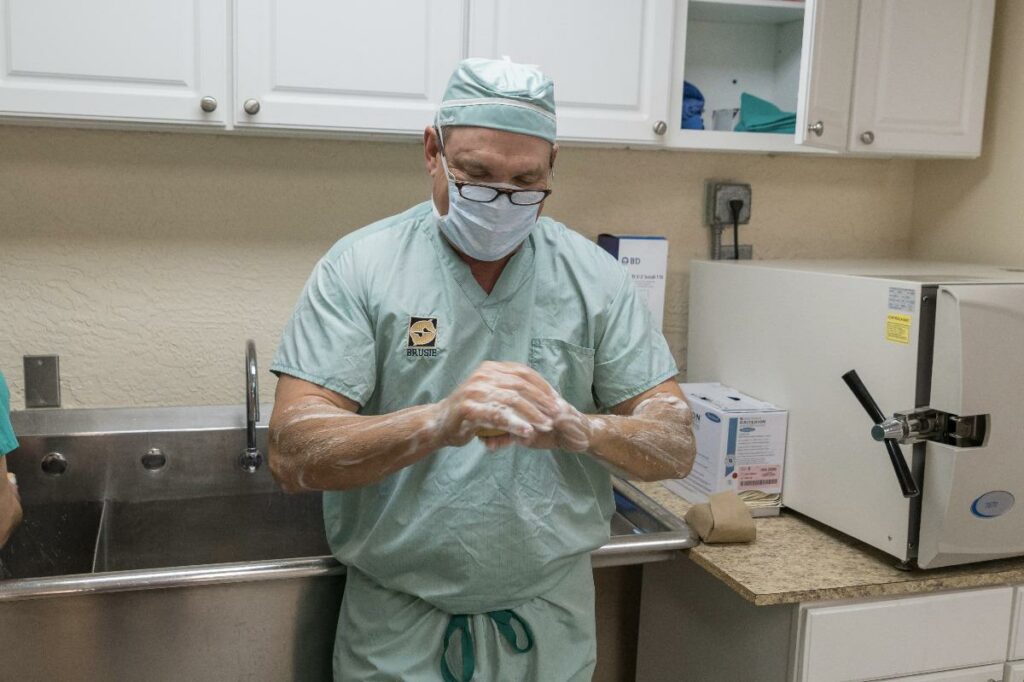
What sets the surgical services at Palm Beach Equine Clinic apart?
Between Dr. Jorge Gomez, Dr. Weston Davis, and myself, we perform just about every type of soft tissue and orthopedic surgeries that are done in our field. Personally, my greatest sense of success is when I see a horse back after surgery going as well or better than it was prior to surgery.
What are the biggest changes you have seen in sport horse medicine over the years?
Currently, the most exciting thing we see going on in medicine is regenerative therapy. Twelve to 15 years ago, we were harvesting bone marrow from the sternum and injecting it into lesions in tendons and ligaments. Now we manipulate the bone marrow or other sources of stem cells to promote more rapid and more functional healing of some of these injuries. I can assure you that in 10 to 20 years what we are doing now will seem stone-aged by then. There are some very clever minds performing some serious research in this field.
How do you stay up-to-date on new medical advances?
Every veterinarian at Palm Beach Equine Clinic tries to attend as many meetings as time allows. We also do a weekly journal club at our clinic to discuss recently published papers in veterinary and human medicine and surgery.
What is the most interesting or challenging surgery that you have done?
Dr. Gomez and I had a three-year-old racehorse that had split his P1 (long pastern bone) and cannon bone in the same leg in a race. We were able to piece together both bones perfectly and the horse recovered brilliantly. He probably could have returned to racing, however, the owners elected to retire him to life as a breeding stallion.
What is something interesting that people may not know about you?
I have three daughters who I am very proud of and tend to brag on maybe a little too much.
How else is the family involved in horses?
My wife [Melissa] and youngest daughter [Kayla] are horse nuts in the true sense of the word. Anything to do with horses, especially show hunters, they are dialed in. Melissa loves riding, and Kayla shows in hunters and equitation.
What makes Palm Beach Equine Clinic a special place for you?
I am blessed to have three good men as business partners. They are my good friends and great people. We are very lucky to have 20-plus veterinarians working with us who are very knowledgeable and caring individuals. We feel like a little practice, but with a lot of people who just get the job done.
Caring for the Senior Performance Horse

Part 2
The veterinarians at Palm Beach Equine Clinic take pride in emphasizing the importance of proper care for equine athletes that are aging into their senior years. Advances in equine medicine are enabling horses to perform longer. Last month, we discussed the importance of routine veterinary examinations to ensure top health, appropriate fitness programs to maintain stamina and muscle mass, treatments for physical discomfort, and proper care throughout the hot summer months. This month, we highlight how the evaluation of metabolic and organ function and proper parasite control can benefit the senior performance horse.
Horses from the ages of 12 and older are considered “senior.” Many horses that are in the prime of their careers are over this threshold and may require extra maintenance in order to continue performing at their best. Maintaining these athletes in peak condition requires teamwork between the owner and their veterinarian.
Metabolic Function of the Senior Performance Horse
An important component of physical health in the aging equine is the metabolic function. As horses age, they become more prone to develop a metabolic disease known as Cushing’s disease. Cushing’s disease, also known as Pituitary Pars Intermedia Dysfunction (PPID), is when disfunction of the pituitary gland results in increased production of Adrenocorticotrophic Hormone (ACTH), ultimately creating overproduction of the hormone Cortisol. Cortisol is the stress hormone and a surplus of this hormone negatively affects the body.
Veterinarians use the fasting test of ACTH that evaluates the hormone levels to screen for possible Cushing’s disease. This hormone test should be conducted every six months to monitor hormone production.
Cushing’s disease is often detected in older horses between 16 and 23 years of age, but it has been documented in horses as young as eight years old. A few of the clinical signs of Cushing’s disease include a change in body conformation such as the development of a swayback and pot belly, lethargic attitude, and in some horses the growth of long, “curly” hair with delayed shedding. Horses suffering from Cushing’s disease are at serious risk to develop laminitis without any specific predisposing causes.
Occasionally, horses may have Cushing’s disease without showing any outward clinical signs as the onset is quite slow. A simple blood test will be extremely helpful in the early detection of Cushing’s and other metabolic diseases.
Organ Function and Parasite Control
Blood tests are also necessary to determine whether a horse has anemia (low red blood cells). Serum chemistry testing can evaluate liver and kidney function to ensure these organ systems are working properly. Palm Beach Equine Clinic has the laboratory equipment on site to run the vast majority of these tests for rapid same-day results.
Palm Beach Equine Clinic also suggests a fecal test to evaluate a horse’s internal parasite count. In Florida, the peak worm season is year-round due to the lack of frost. The effectiveness of different dewormers can be measured using a fecal egg count reduction test, which involves performing a fecal egg count before and after deworming a horse. Equine tapeworms are difficult to identify in fecal examinations, so deworming for tapeworms annually with a product containing praziquantel, available in products such as Zimectrin Gold®, Equimax®, and Quest Plus®, is strongly recommended.
Establishing an effective deworming program for equine parasites has become a debated topic as veterinarians have changed their views on worming in recent years. New research has found that a minimal parasite load within the horse’s hind gut is actually helpful in producing a natural immunity. However, it is crucial to control the parasitic load. Due to the emergence of new resistant parasites, the recommended method is to practice proper barn management for prevention and control along with rotational treatment with anthelmintic medications.
Environmental management is imperative to equine parasite control. Veterinarians recommend removing manure from pastures at least twice weekly. Mowing and harrowing pastures regularly will break up manure and expose parasite eggs to the sun. If possible, rotate the use of pastures by providing a period of rest or allowing other livestock to graze them. Grouping horses by age in a pasture can reduce exposure to certain parasites.
Additionally, reducing the number of horses per acre to a minimum can prevent overgrazing and reduce fecal contamination of the grazing area. Owners should consider feeding horses in a feeder for hay and grain rather than on the ground. Lastly, caregivers should routinely groom all horses to remove bot eggs from the hair to prevent possible ingestion.
Contact Palm Beach Equine Clinic for an Evaluation of Your Senior Performance Horse
It is important for owners to consider all of these issues in the senior performance horse and coordinate with their veterinarian for routine testing in horses 12 years and older. Have questions? Contact your Palm Beach Equine Clinic veterinarian today. Did you miss “Caring For The Senior Performance Horse Part 1?” CLICK HERE to catch up.
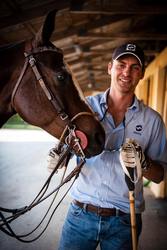
Dr. Bryan Dubynsky joined the team of veterinarians at Palm Beach Equine Clinic in 2009 and specializes in treating sport horses, working to return them to top performance after injury or complication. Get to know Dr. Dubynsky:
1. Where did you grow up and what is your background with horses?
I grew up in Northern Indiana on a horse farm. I was fortunate enough to breed horses, show on the Midwestern circuit, and train our horses. My father is a physician and I’ve always grown up with an interest in medicine. Choosing to become a veterinarian seemed to be a natural fit that combined my love for horses and medicine.
2. Who has been the biggest influence in your life or career? What did they teach you?
I spent my entire childhood from eight to 18 years old with a third-generation horse trainer from Kentucky. He taught me horsemanship and patience, two crucial parts of a good foundation for successfully working around horses every day. If I could give advice to anyone thinking about becoming a veterinarian, it would be to seek out the top people in the industry and work with them. Learn as much as you possibly can from the people who have been practicing for a long time.
3. What is your specialty/main focus as a vet?
My main focus and interest is sport horse medicine. I love focusing on improving athletic performance and treating sports-related injuries to help clients get their equine partners back to the top!
4. What do you love about your job?
I love working at Palm Beach Equine Clinic for the exceptional medical and surgical capabilities and experiences available. I also love the camaraderie of all the employees; we really work as a team! Teamwork is paramount for making the clinic successful. I love the opportunities to travel throughout North America and Europe to see really cool places through work with my clients. I love working with the competition horses and being a part of the atmosphere of high-level competition, as well as caring for the sweet trail horses at home.
5. What is one of the most interesting cases you have worked on?
My own horse, Batman. He was an abandoned polo pony suffering from West Nile Virus. He was paralyzed for three days and no one wanted to treat him. We treated him with intensive care for three days and used a tractor as a last-ditch effort to get him to stand. He has since made a full recovery and is currently playing polo.
The veterinarians of Palm Beach Equine Clinic have always enjoyed contributing to support the local community in Wellington, FL. As a leader in equine veterinary medicine, Palm Beach Equine Clinic makes it a priority to share knowledge and guide aspiring youth. Currently, through Wellington High School’s (WHS) Equine Pre-Vet Program, Palm Beach Equine Clinic has a hands-on program for students to introduce them to a career as promising young veterinary professionals.
Kickstart a Career in Veterinary Medicine
The Equine Pre-Vet Program at WHS provides students with an opportunity to pursue a rigorous, accelerated science program to prepare them for veterinary medicine and/or animal sciences at the college level. Equine Pre-Vet students are required to complete 20 hours of community service in an animal-based area during each year of high school. As a senior in high school, students are also required to intern with an animal healthcare facility, complete research assignments on veterinary medicine, and prepare veterinary case studies.
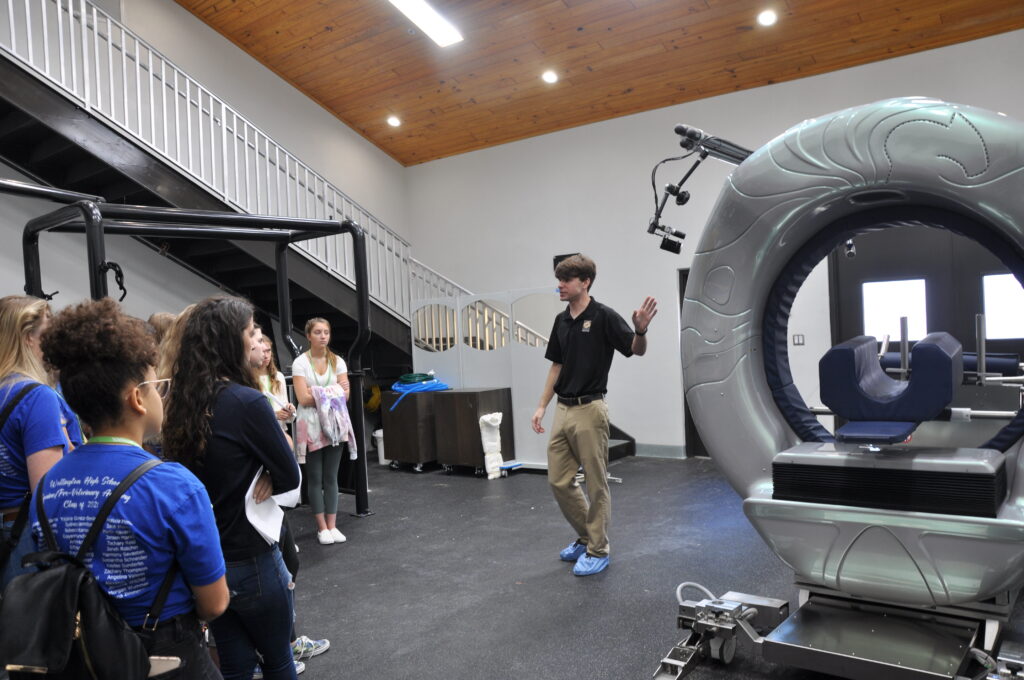
WHS seniors who choose to pursue the Equine Pre-Vet Program have a wealth of knowledge at their fingertips with one of the world’s most advanced equine medical centers just down the road. Palm Beach Equine Clinic is home to more than 30 world-class veterinarians who all know the process of becoming a top veterinarian within the industry.
Learning from a diverse team of veterinarians
Through the program at WHS and the generosity of the veterinarians at Palm Beach Equine Clinic, students in the Equine Pre-Vet Program have the unique opportunity to learn all about the profession from the very best. Seniors in the program are given the chance to shadow veterinarians as they work at the clinic, as well as out on ambulatory calls at the farms. The program requires that each student obtain a certain number of externship hours, but Palm Beach Equine Clinic allows the students to help and observe for as many hours as desired. Many students show a high level of interest and become highly involved at the clinic. Palm Beach Equine Clinic tries to accommodate each student for their participation at every level.
A program is also offered for junior students at WHS who are considering joining the Equine Pre-Vet Program when they become seniors. Junior students are invited to the clinic to learn about various paths in veterinary medicine and tour the facility in small groups. Palm Beach Equine Clinic sets up multiple stations for them to learn about things including blood work, physical exams, reproduction, and business management.

Palm Beach Equine Clinic’s Dr. Janet Greenfield-Davis is very involved with the program and enjoys teaching students of all ages. She has been involved in the local school system’s career day for younger children at the elementary level and also mentors the senior students who have already chosen the veterinary path involved in the externship program.
“We try to play an active role in our community, and we really enjoy having the kids visit the clinic,” said Dr. Greenfield-Davis. “When I went to high school, it was just general education, but now they really specialize in gearing the children towards specific programs in high school, and I think that is pretty impressive. To have PBEC right around the corner is handy for them, and it is nice for us to have the kids come through.
“We have some students that will come in on their own outside of school and ask to volunteer,” continued Greenfield-Davis. “We also have two girls that are in vet school now that started here in high school. They went to local colleges and they continued to come to our practice and participate all through college. We were able to write them recommendations for veterinary school, and they both got in, so we are super proud of them. We try to do all we can for the high school. We are really happy that we can provide those opportunities for the students and see them excel.”
As the summer heat rapidly approaches, the veterinarians of Palm Beach Equine Clinic remind all equine owners to keep their horses well hydrated.
Fresh, Clean Water
The average horse drinks between five and 10 gallons of water per day. It is important to provide clean, fresh water at all times and be aware of possible increased water consumption during extremely hot days.
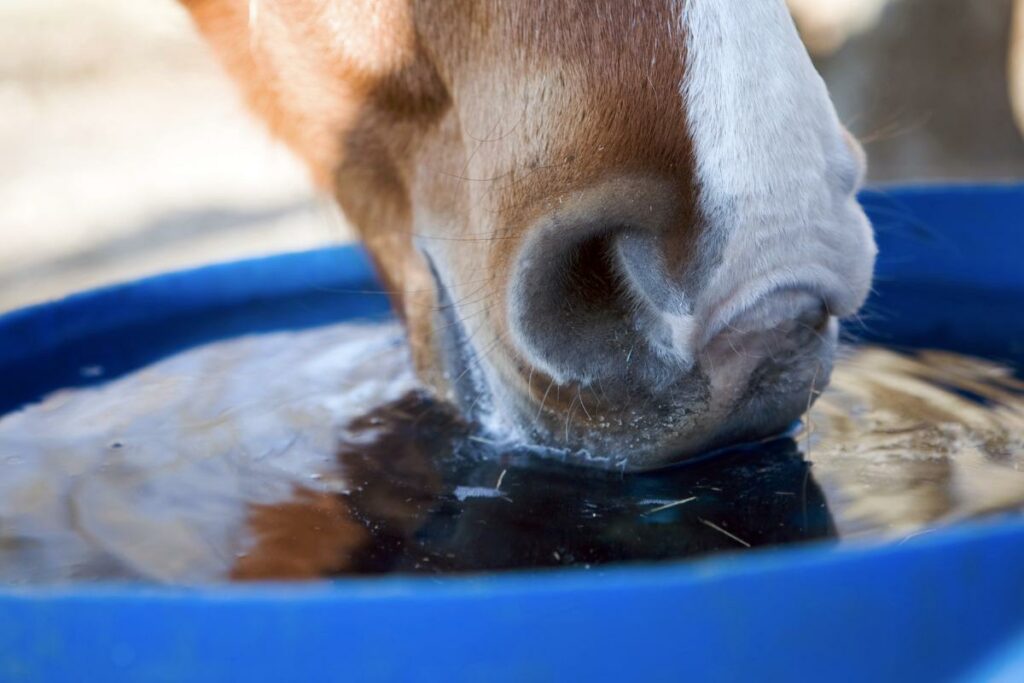
Salt
Sodium in a horse’s diet is also very important to maintain proper hydration. Providing a salt block or supplementing with electrolytes can help ensure that a horse is meeting their sodium requirements.
Sweat It Out
Especially in the extreme summer heat, horse owners should pay attention to the amount of sweat their horse is producing. Anhidrosis, or the inability to sweat normally, can be a common challenge during the summer months, particularly in hot, humid climates. A horse with Anhidrosis is often called a “non-sweater.” In addition to lack of sweat, signs of Anhidrosis can include increased respiratory rate, elevated temperature, areas of hair loss, and dry, flaky skin. Presentation of these signs indicates that the horse should be seen by a veterinarian immediately.
Additional Tips
Make sure your horse has…
- Access to shade throughout the day.
- Exercise that is scheduled when the temperatures are lower, usually earlier or later in the day.
- Turnout that is limited to the night or cooler portions of the day.
- Fans indoors during extreme heat.
- Electrolyte supplementation as needed per veterinarian’s recommendation.

Part 1
Advances in equine medicine are enabling horses to perform longer in their athletic careers than ever before. Together with veterinary care from Palm Beach Equine Clinic, educated owners can offer senior horses a happy and pain-free life as they age into their senior years.
Horses from the ages of 12 and older are considered “seniors,” but they often compete successfully into their teenage years. Many horses that are in the prime of their careers may require extra maintenance in order to continue performing at their best, and advances in veterinary care have helped extend careers. An 18-year-old equine athlete would have been rare 10 years ago, but today, there are horses performing at a high level well into their senior years. To maintain these athletes requires more work on the owner’s part, as well as the veterinarian’s part, however, preemptive attention to an aging equine’s needs may help keep your partner performing longer.
Maintain Top Health Over the Years
There are several areas of care that owners should consider in order to maintain their horse’s top health and ensure continued success. It is important to remember that just as the human body changes with age, the horse’s body does the same.
- Owners should contact their veterinarians on a routine basis to have their horse’s overall health and fitness evaluated, no matter what the horse’s job is. All regularly performing senior horses should be evaluated a minimum of twice a year. If it is a pleasure horse, it should be evaluated at least once a year.
- An appropriate fitness program is imperative to the senior horse’s performance. As horses age, it can become increasingly difficult to maintain their fitness. Any exercise that builds your horse’s stamina and muscle mass is essential, and the more your horse gets out of its stall and moves around the better. Anything from riding lessons to trail riding, or even hand walking, can be beneficial. There are new exercise aids available, such as treadmills, which are great for keeping the senior horse in top shape. Owners should talk to their veterinarian to help create a great fitness program that works for both them and their horse.
- Like any athlete, horses can experience physical setbacks, so it is important for owners to have their horse’s gaits evaluated routinely. Veterinarians can suggest appropriate treatments to avoid creating larger issues, whether the horse needs a little assistance with the flexion in their necks or joint injections to ease any discomfort.
- It is important to make sure that the senior horse’s stall is maintained for sanitation purposes and with a nice, deep bed to lay down in. The stall should be out of the direct sunlight and have fans for effective air movement and plenty of freshwater to prevent overheating.
Dr. Selina Passante-Watt traded in the cold winters of Canada for the sunny shores of South Florida and joined the practice at Palm Beach Equine Clinic in the fall of 2013. A veterinarian at just 32 years of age, Dr. Passante-Watt enjoys the team-oriented aspect and vast resources that working at Palm Beach Equine Clinic offers. She now splits her time between winters working at Palm Beach Equine Clinic and running a mobile practice with her husband in Western Canada during the summers.
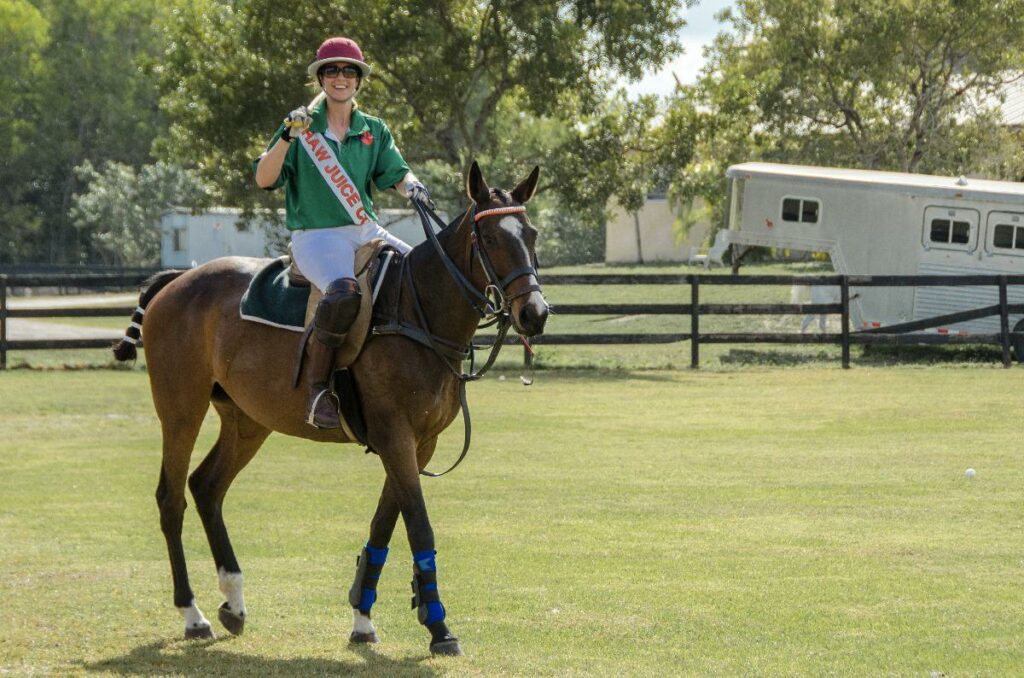
“There are a lot of specialists and very intelligent people at that practice, so the continual learning is incredibly valuable, especially as a young vet,” she acknowledged. “I learn every day. It is an amazing experience to be able to walk down the hall and knock on the door of one of the best board-certified surgeons or other specialist and say, ‘Hey, can you help me with this?’ You do not realize how beneficial that is until you leave, and you are in the middle of Western Canada and you wish that you had that.”
Originally from Winnipeg, Manitoba, Canada, Dr. Passante-Watt graduated from the Western College of Veterinary Medicine in Saskatoon, SK, in June 2012. After graduation, she moved west to Calgary, Alberta, and completed an internship in equine medicine and surgery at Moore Equine Veterinary Centre. She and her husband, who is also an equine veterinarian, relocated to South Florida in July of 2013 in order to pursue their equine veterinary careers.
Dr. Passante-Watt started riding when she was 10 years old and was a typical horse-crazy child. She took western riding lessons for a few years before falling in love with polo. When she was in high school, she got a job grooming and exercising polo horses in Winnipeg, which continued for six summers.
After high school, Dr. Passante-Watt was unsure what career path she wanted to take, so she embarked on a backpacking trip in Australia. She picked up small jobs while traveling, one being picking mangos. While on that mango farm, she found a small dog that was wounded from a fight with another dog. Dr. Passante-Watt took the dog, fixed his wounds, and nursed him back to health. It was that experience that inspired her to apply to veterinary school.
While attending vet school in Saskatoon, Dr. Passante-Watt met her husband, Dr. Walker Watt, and the pair got married in October of 2013. During his fourth year of vet school, Dr. Watt attended a conference and met some veterinarians from Teigland, Franklin, and Brokken, a racetrack practice at Gulfstream Park in Florida. He went to visit and did an externship there, later receiving a job offer. Dr. Watt and Dr. Passante-Watt then made the decision to move to Florida, where Dr. Watt took the racetrack job, and Dr. Passante-Watt found a position at Palm Beach Equine Clinic.
“Palm Beach Equine Clinic is a great practice,” Dr. Passante-Watt stated. “I have been working with Dr. Jorge Gomez, who works mainly on sport horses and more specifically on show jumpers, so it has been great getting involved in that world and receiving mentorship from Dr. Gomez. There is a lot of sport horse medicine that we do not see back home in Canada. It is a different world in Wellington; everything is a step ahead.”
The first year Dr. Passante-Watt and her husband moved to Florida, they stayed and worked for the full year. They then decided to split their time between the U.S. and Canada, just traveling to Florida for the winter season. They opened their own mobile practice in Western Canada, which Dr. Watt now runs year-round while his wife soaks up everything she can learn in Wellington throughout the winter.
“There is a lack of equine veterinarians in Southern Alberta where we live,” Dr. Passante-Watt explained. “There are a lot of mixed animal practitioners, but not a lot of specific equine practitioners, let alone in performance horses. That is why we decided to open a practice and just work on horses, and it has been going really well so far.”
Dr. Passante-Watt enjoys being able to draw on the resources of Palm Beach Equine Clinic even when she’s in Canada for the summer. “You can easily email people, send images, and pick up the phone and call someone with questions,” Dr. Passante-Watt stated. “I find everyone at Palm Beach Equine Clinic to be very helpful. As a vet early in my career, I think it is a great thing to work in a practice like that because it definitely pushes you to learn and be your best because you are working with the best.”
Having a state-of-the-art facility and equipment at Palm Beach Equine Clinic at her disposal throughout the winter is also a huge advantage.
“It is an amazing difference,” Dr. Passante-Watt noted. “I see both sides of it, because I am in Canada in the summer in my own small mobile practice with no bells and whistles, and then I come down to Palm Beach Equine Clinic and you have everything you could want at your fingertips. Every sort of pharmaceutical need, every tool, every cutting-edge technology, they just have it all right here. For the hospital, there are technicians and interns to monitor your cases overnight, and the 24-hour Intensive Care Unit is state-of-the-art. It is definitely set up to be successful, and with so many veterinarians, everyone is great about helping one another.”
Dr. Passante-Watt has many different veterinary interests, including diagnostic imaging, ophthalmology, lameness, dentistry and internal medicine. She really enjoys general practice, specializing in a little bit of everything. She is also certified in acupuncture and equine chiropractic from Options for Animals Chiropractic School.
As far as future goals, Dr. Passante-Watt plans to take it year by year, continuing to come to Palm Beach Equine Clinic in the winters, continuing to learn, and being the best veterinarian that she can be.
For Veterinary Technician Brianna Ploskunak, 22, of Royal Palm Beach, FL, horses are a passion. But not in the way you may think. Raised by a mother who rode and competed, Ploskunak found an early infatuation with all things equine that eventually drew her to veterinary medicine. At Palm Beach Equine Clinic, where she has been a part of the team since 2016, Ploskunak is one of 30 veterinary technicians who manage the hands-on care of equine patients and support the veterinarians in all aspects of the day-to-day operations. She works directly under Dr. Bryan Dubynsky, who specializes in sport horse medicine within the bustling competition atmosphere of Wellington, FL.
We caught up with Veterinary Technician Brianna Ploskunak to find out more:
What was your first introduction to horses?
My mom used to be a rider herself, so I grew up constantly surrounded by horses. She [rode] dressage for many years. I quickly followed in my mother’s footsteps and fell in love with the animal and the sport, although I never competed myself. Being around horses my entire life, I felt the need to do whatever I could to advance the health of each and every horse that I see. It means a lot to me to be able to contribute to their fast and healthy recovery.
What do you enjoy most about being a veterinary technician?
The number one thing I enjoy about treating horses is being a part of their journey from start to finish. Nothing brings me more joy than to see a horse that I have been working with through their recovery return to the show ring happy and healthier than ever before. These animals never cease to amaze me with their way of getting back onto their feet after an injury.
What is your average day like at Palm Beach Equine Clinic?
On an average day at Palm Beach Equine Clinic, I first meet Dr. Dubynsky to go over the morning appointments and gather all of the equipment and resources we need for the upcoming day. As we finalize our schedule, I work on completing all open items such as billing and inventory. We then prepare the truck to leave for the day and travel to a variety of different appointments throughout the Palm Beach County territory. Appointments vary depending upon the condition of the patient but often include radiographs and ultrasounds to injections and vaccinations. After we have seen all patients for that day, we return to the clinic and re-stock the inventory we have used that day. Lastly, we prepare for the following day by composing a new schedule of appointments and/or on-call horse show responsibilities.
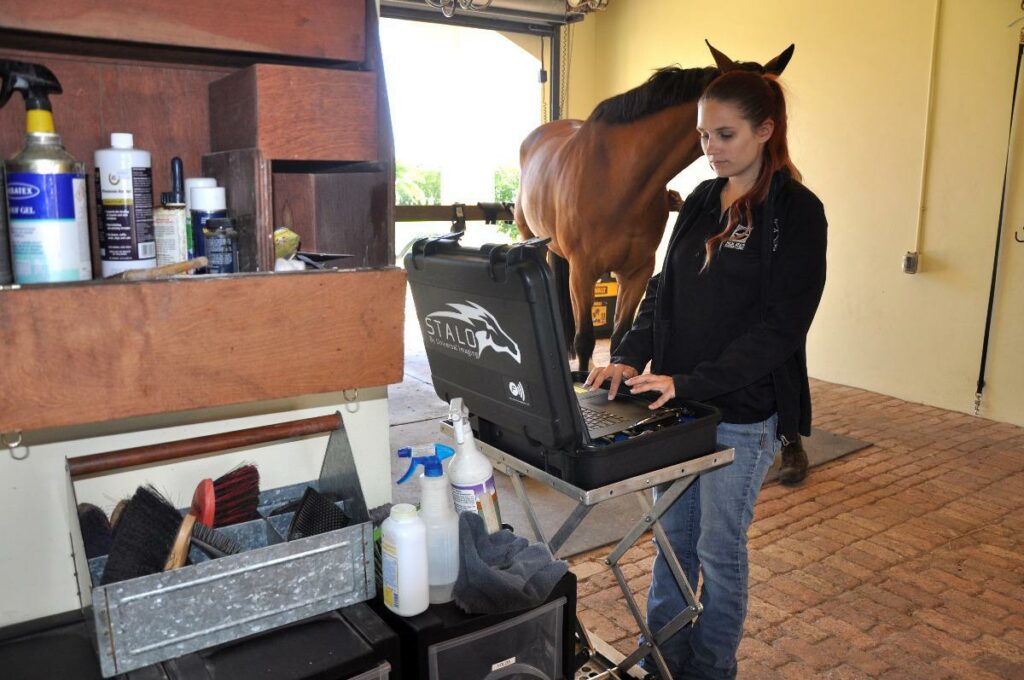
What is your favorite part about being a member of the Palm Beach Equine Clinic team?
My future goal is to continue to learn from the many experienced veterinarians I work alongside every day and build my experience and knowledge in the industry. That’s probably my favorite part as well; working alongside such talented and genuine people willing to give me multiple opportunities to learn and grow as a professional. It’s very hard to find a group of superiors willing to go the extra mile to teach young employees.
I have been able to experience some amazing things at Palm Beach Equine Clinic, including the intricacy of equine surgery and how the work of equine surgeons can bring a struggling horse back to top health. I really enjoy sports medicine because it’s not always sick horses – there is always something you can do to help the horse get back to peak performance. Whether it be radiographs, ultrasounds, injections etc., there is always something that can be done for the benefit and of the health of the horse.
What can we find you doing when you are not at Palm Beach Equine Clinic?
When I’m not working, you can catch me racing go-karts and spending quality time with my family, especially my one-year-old nephew, Elijah!

